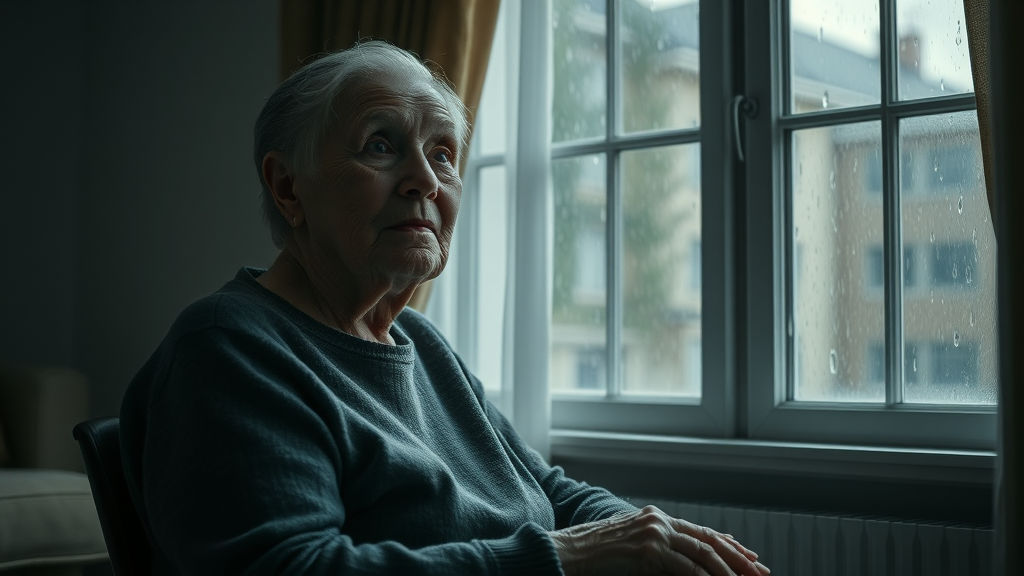Did you know that nearly 20% of older adults experience a mental health condition, yet most never receive proper care? This overlooked crisis affects not only happiness but also long-term health outcomes. As the population of older adults continues to rise, addressing senior mental health is more urgent than ever. Whether you’re a caregiver, family member, or older adult yourself, understanding and supporting mental well-being can transform lives. This guide reveals practical actions, debunks myths, and empowers you to make positive changes fast.
Why Senior Mental Health Demands Urgent Attention
The significance of senior mental health cannot be overstated. In the United States alone, millions of older adults face unique mental health issues , yet they are among the demographic least likely to receive help. Studies show that mental health problems are frequently misdiagnosed or dismissed as “normal aging.” This oversight not only reduces quality of life but increases risk for other health conditions, such as chronic illnesses and disability. Behavioral health support and timely intervention are crucial for older adults to thrive emotionally, cognitively, and socially.
Practical examples abound: consider the older adult who isolates themselves due to depression, missing opportunities for social connection and support. Or the retiree struggling to manage diabetes, unaware that anxiety is sabotaging their self-care. Each story illustrates why mental health care for seniors is a pressing public health issue that calls for action from families, care providers, and communities alike.
Did you know that nearly 20% of older adults experience a mental health condition, yet most never receive proper care? This overlooked crisis affects not only happiness but also long-term health outcomes.
- Only 1 in 3 older adults with depression receives appropriate treatment.
- Social isolation increases risk for dementia by 50% and depression by nearly 65%.
- Untreated mental health conditions can shorten lifespan just as much as chronic physical diseases.

- Senior mental health is shaped by age-related changes, chronic health issues, bereavement, and social isolation, making its needs different from other life stages.
- Older adults experience both unique risk factors and protective factors, requiring specialized care and community responses.
Understanding Senior Mental Health: Definitions and Core Concepts
What Constitutes Mental Health for Older Adults?
Mental health for older adults encompasses more than the absence of disease—it’s the presence of emotional resilience, cognitive function, and the ability to maintain satisfying relationships. At this stage of life , mental health means adapting to changing roles, managing losses, and coping with illnesses that often accompany aging. Core components include a positive outlook, productive daily activities, healthy interpersonal connections, and effective coping with stress or setbacks. For seniors, reaching out for mental health care requires understanding normal aging versus signs of a mental health condition .
Maintaining mental health supports the ability to engage in activities, stay connected with loved ones, and participate in decision-making about one’s life and care. Proper attention to well-being can enhance quality of life and foster autonomy for as long as possible.
Behavioral Health and Its Impact on Senior Mental Health
Behavioral health includes not only emotional and psychological well-being but also how behaviors—such as physical activity, diet, and social engagement—affect health. For older adults , behavioral health acts as both a risk factor and a protective factor: negative behaviors (like substance use or inactivity) can worsen outcomes, while healthy habits bolster resilience. Integrating behavioral health with routine medical care improves health outcomes for those suffering from multiple health conditions or functional decline.
Collaboration among care providers , families, and communities enhances the capacity of seniors to maintain healthy lifestyles and avoid the downward spiral that can accompany untreated behavioral health issues.
Why 'Older Adult' Mental Health Is Unique
The challenges of aging impact mental health in distinctive ways. Unlike younger populations, older adults often cope with retirement, bereavement, increased medical visits, and concern over losing independence. Stigma remains strong, and many older adults hesitate to discuss emotional distress—believing it is simply part of “getting old.” That attitude, combined with physical limits, can hinder access to primary care and psychological support.
Age-related changes in brain function, compounded by coexisting chronic health conditions , can make symptoms less recognizable or more difficult to treat. These differences highlight the necessity for mental health care approaches tailored specifically to elderly needs.
Mental health is not a destination, but a process. It’s about how you drive, not where you’re going. - Noam Shpancer, PhD
Prevalent Mental Health Conditions Affecting Older Adults
| Mental Health Condition | Description | Estimated Prevalence in Older Adults |
|---|---|---|
| Depression | Persistent sadness, loss of interest, physical complaints | 8-16% |
| Anxiety Disorders | Excessive worry, restlessness, irritability, sleep problems | 10-15% |
| Dementia | Progressive cognitive decline, memory impairment | ~10% |
| Substance Use Disorder | Misuse of alcohol or prescription drugs | 3-5% |
| Bipolar Disorder | Mood swings between depression and mania | 1-2% |
Mental Illness and Senior Mental Health: Key Overlaps
There are significant overlaps between general mental illness and conditions seen in the elderly. Depression and anxiety, while common across all ages, often go undiagnosed in older adults due to overlapping symptoms with physical illnesses (like fatigue or sleep disturbances). Cognitive impairment, which may indicate either dementia or delirium, further complicates diagnosis. Behavioral health support needs to address physical and mental symptoms together for effective care of older people .
Older adults might also mask or rationalize mental illness symptoms, dismissing mood or memory changes as “normal.” Timely identification of these issues is vital to prevent further deterioration and promote a better quality of life .
Mental Health Condition vs. Health Condition in the Elderly
Differentiating between a mental health condition and a physical health condition in seniors is essential. Symptoms of one can mimic or worsen the other; for example, thyroid disorders may produce depressive symptoms, while untreated pain can lead to irritability and anxiety. Conversely, chronic mental health problems can increase vulnerability to other health conditions such as heart disease or diabetes.
Effective health care for older adults requires integrated assessment: considering mental health alongside physical health to develop a holistic care plan that addresses overlapping issues. This is especially crucial as studies show coordinated care promotes better outcomes and reduces hospitalizations.
Key Risk Factors That Influence Senior Mental Health
- Chronic physical health conditions: diabetes, heart disease, arthritis
- Mobility limitations and chronic pain
- Recent loss of spouse or loved ones
- Medication interactions and polypharmacy
- Living alone and limited social contact
- Loss of meaningful activities or roles post-retirement
- Physical barriers to community participation

Chronic Health Issues and Their Impact on Senior Mental Health
Chronic health conditions are common among older adults and often compound mental health issues . Chronic pain, limited mobility, and repeated hospitalizations can create a persistent sense of frustration, helplessness, and social withdrawal. Diabetes and cardiovascular disease, for instance, have strong links to depression because of lifestyle restrictions and ongoing stress. Polypharmacy (taking multiple medications) introduces further risks, including mood changes and confusion, all undermining mental wellness.
These interconnected challenges require ongoing collaboration among primary care providers, mental health specialists, and families to tailor treatments and provide emotional support for each older adult.
Risk Factors: Physical, Social, and Environmental
Key physical risk factors include chronic illnesses, sensory decline, and a history of mental illness. Social risk factors—such as bereavement, family conflict, or inadequate support networks—strongly affect senior mental health . Environmental elements, like living in an unsafe neighborhood or lacking access to quality transportation or health care, exacerbate vulnerability even further.
Older adults benefit when care providers take a comprehensive look at all these risk factors and design individualized plans to address them effectively.
Recognizing the Signs of Declining Senior Mental Health
- Persistent sadness, anxiety, or apathy
- Confusion, forgetfulness, or frequent memory lapses
- Withdrawal from favorite activities or social circles
- Sleep changes—insomnia or excessive sleeping
- Changes in appetite or unexplained weight loss
- Difficulty managing personal care or finances
- Uncharacteristic anger, irritability, or aggression
- Frequent somatic complaints without clear physical cause
How to Distinguish Between Typical Aging and Mental Health Issues
It’s important to separate usual age-related changes—like mild forgetfulness or slower information processing—from warning signs of a mental disorder . Normal aging might bring some cognitive slowing, but it shouldn’t cause significant confusion, persistent sadness, or major changes in daily function. When an older adult becomes increasingly withdrawn, struggles with self-care, or experiences prolonged mood disturbances, these are red flags for underlying mental health problems .
Collaboration with a primary care provider or mental health professional is often necessary to properly evaluate and address these warning signs, ensuring early intervention and better long-term outcomes.
The Impact of Social Isolation on Older Adults’ Mental Health
- Experts report up to 43% of older adults experience regular feelings of loneliness, a major risk factor for depression and anxiety.
- Social isolation increases the risk of premature death as much as smoking or obesity.
- Lack of social support often leads to faster cognitive decline and health deterioration.

Mitigating Isolation-Related Mental Health Challenges for Older Adults
Mitigating the dangers of social isolation takes concerted effort. Encouraging group activities like art classes, book clubs, or gardening fosters a sense of purpose and connection. Technology—video chats, online support groups, and social media—can help bridge the gap where in-person visits are difficult. Family and caregivers should schedule regular check-ins and facilitate transportation to community centers or events.
Communities and policymakers can also address isolation by improving access to age-friendly transportation, support group networks, and educational outreach to reduce stigma and awareness about mental health care for older adults.
Proactive Daily Steps to Improve Senior Mental Health
- Regular Exercise: Even brief daily walks improve mood, reduce anxiety, and foster social opportunities.
- Maintain a Routine: Structured days add stability, minimizing stress and confusion.
- Creative Activities: Art, music, or writing boosts brain health and relieves boredom.
- Foster Social Connections: Frequent calls, visits, or community participation combats loneliness.

- Keep a sleep and meal schedule for predictability
- Integrate relaxation techniques—like meditation or deep breathing—each morning and evening
- Set attainable goals to build confidence and accomplishment
- Join a new community activity or class to expand support networks
- Discuss emotional struggles openly with a trusted person or health professional
Accessing Mental Health Care for Older Adults
- Cultural stigma and misconception prevent many from seeking help
- Limited mobility and transportation issues can hinder access to regular appointments
- Not all providers are adequately trained in geriatric mental health care
- Financial concerns or insurance restrictions limit treatment options
Options for Mental Health Care: In-Person, Telehealth, and Community Support
Care options for older adults are more flexible than ever. In-person therapy and psychiatric consultations remain vital for complex cases or those without reliable digital access. Telehealth visits expand access for those with mobility or transportation barriers, allowing regular mental health check-ins from home. Community-based programs, such as senior centers or support groups, offer therapeutic engagement and social connection. Engaging a primary care provider as a first point of contact ensures seamless integration of physical and mental health support.

Navigating Healthcare Systems as an Older Adult
Older adults and caregivers often face challenges navigating health insurance, medical referrals, and diverse treatment options. Building a relationship with a primary care provider who understands the unique needs of seniors can simplify access to specialist referrals and ongoing behavioral health management. Proactive self-advocacy—bringing up emotional concerns at routine appointments, asking about psychiatric referrals, and clarifying medication side effects—empowers older adults to receive the best possible care. Family members or trusted friends should participate in care planning whenever possible, ensuring each health condition is addressed holistically.
Behavioral Health Interventions for Senior Mental Health
- Cognitive-behavioral therapy (CBT) adapted for older adults
- Medication management and regular review for appropriateness
- Engagement in group activities—therapeutic art, exercise, or reminiscence sessions
- Psychoeducation for both older adults and caregivers
"Therapeutic engagement can reduce the progression of many mental health conditions in older adults."
Evidence-based interventions are key for improving outcomes in senior mental health. Psychotherapy tailored to late-life challenges, attentive medication review, and structured group support have all demonstrated positive results in recent studies. Behavioral health interventions also provide crucial coping strategies and resilience training for older adults experiencing functional limitations or loss.
Preventing and Responding to Mental Disorder in Older Adults
- Early screening for depression and anxiety during routine health care visits
- Educate older adults and families on warning signs of mental disorders
- Prioritize quick responses to emotional crises or signs of self-harm
- Encourage participation in prevention programs through community resources
Warning Signs That Require Immediate Action
Seek urgent health care if an older adult exhibits suicidal thoughts, severe confusion, sudden withdrawal, violent behavior, or stops caring for themselves entirely. Physical symptoms like unexplained pain or falls may also indicate underlying mental health crises requiring fast intervention by a medical or mental health professional.
Don’t hesitate to call an emergency line or a behavioral health crisis team for immediate support—swift intervention can save lives.
Overcoming Stigma: Discussing Mental Health with Older Adults
- Mental health is just as important as physical health—old beliefs to the contrary can delay lifesaving care
- Open, nonjudgmental communication is vital for reducing shame and fear
- Education and honest sharing fight misconceptions and empower older adults to seek help
Building a Supportive Conversation Around Senior Mental Health
Start the conversation gently: “How have you been feeling lately?” or “Have you noticed any changes in your mood?” Use examples, validate emotions, and listen without minimizing concerns. Avoid negative labels and acknowledge the courage it takes to talk about emotional struggles. Family and caregivers can be role models by expressing their own feelings and sharing positive experiences with mental health care. Remember, offering to attend appointments or research resources together reduces anxiety and helps older adults feel less alone.
Family and Community: Vital Roles in Senior Mental Health
- Check in regularly and encourage participation in favorite activities
- Help manage medication and health care appointments
- Advocate for access to community resources and transportation support
- Encourage honest dialogue around emotions and mental health
- Join caregiver or support groups for mutual learning and encouragement
Community Resources: Connecting Older Adults with Behavioral Health Services
Many communities have resources to support senior mental health : senior centers, adult day programs, transportation services, and mental health hotlines. Local Area Agencies on Aging, Alzheimer’s Association chapters, religious groups, and online platforms provide counseling, support groups, and information directories. Professionals—social workers, primary care providers, mental health specialists—can guide older adults to the most appropriate services based on individual needs and preferences.
Integrating Senior Mental Health with General Healthcare
- Building care teams that address both physical and mental health issues
- Routine mental health screenings during primary care visits
- Sharing information across care providers to align treatment goals
- Health systems can design policies to prioritize behavioral health for older adults
Tailoring Health Care for Older Adults with Multiple Conditions
Customized care plans for older adults are critical, particularly when managing multiple health conditions (such as heart disease, arthritis, and depression). Integrated care combines expertise from primary care, geriatrics, psychiatry, and behavioral health providers. Communication—and coordination—are the cornerstone: care teams should meet regularly, share updates, and adjust strategies based on patient feedback and results. Frequent follow-up supports medication safety, tracks warning signs, and ensures each senior’s unique social, physical, and emotional needs are met.
Top Lifestyle Changes for Supporting Senior Mental Health
- Set a consistent sleep schedule and maintain healthy sleep habits
- Eat a nutrient-rich diet, prioritizing fruits, vegetables, whole grains, and lean proteins
- Stay physically and mentally active through daily exercise and new challenges
- Limit alcohol and avoid recreational drugs unless prescribed and monitored
- Balance technology use to stay connected while avoiding information overload
Practical Examples of Health-Promoting Habits in Older Adults
Many older adults experience health benefits from simple habit shifts, such as joining a walking club, volunteering at their church, or participating in lifelong learning programs. Regular meal planning supports both nutrition and social interaction for those who share meals with friends or relatives. Limiting blue-light exposure at night and practicing bedtime routines improves sleep quality—directly benefitting mental health. Even digital tools, like online puzzles or mindfulness apps, boost cognitive health and provide a sense of accomplishment. The key is to create an environment where healthy choices are both easy and enjoyable.
People Also Ask: Common Questions on Senior Mental Health
What is the most common mental illness in the elderly?
- Depression is the most prevalent, affecting millions of older adults. Addressing it swiftly can prevent further health decline.
What to do with a mentally ill elderly parent?
- Seek compassionate health care, provide emotional support, and explore behavioral health services for targeted treatment.
What are the signs of poor mental health in the elderly?
- Warning signs include mood changes, withdrawal, confusion, sleeping problems, and difficulty performing daily tasks.
What is mental health in older people?
- It involves emotional, psychological, and social well-being, encompassing conditions like depression, anxiety, and cognitive decline.
Frequently Asked Questions Regarding Senior Mental Health
-
How can older adults maintain positive mental health?
Regular exercise, social engagement, adequate sleep, balanced nutrition, and creative hobbies are proven strategies for maintaining a positive outlook and cognitive function among older adults. -
What should caregivers know about behavioral health issues in seniors?
Caregivers should watch for changes in mood, interest, and function; communicate openly about mental health concerns; and seek guidance from health care providers specializing in geriatrics or behavioral health. -
Are there specific therapies proven effective for mental health conditions in the elderly?
Cognitive-behavioral therapy, reminiscence therapy, group counseling, and carefully managed medication (under medical guidance) are all effective approaches for treating senior mental health conditions.
Action Steps: Resources and Next Moves for Improving Senior Mental Health
- National Suicide Prevention Lifeline: 988
- National Alliance on Mental Illness (NAMI) Helpline: 1-800-950-NAMI
- Local Area Agency on Aging: Visit Eldercare Locator (eldercare.acl.gov)
- Alzheimer’s Association: 1-800-272-3900
- Find a local geriatric psychiatrist through the American Association for Geriatric Psychiatry
- Identify an accessible support group or therapist for the senior in your care
- Set up regular check-ins with primary care and mental health providers
- Encourage or facilitate participation in community programs for social engagement
- Create a personal wellness and safety plan, including emergency contacts and crisis resources
Recap: Key Takeaways to Enhance Senior Mental Health
- Early identification and intervention—especially for depression and anxiety—change outcomes for older adults
- Social support, community resources, and behavioral health integration are essential
- Family, friends, and care providers can together boost senior mental health with daily, proactive steps
Learn More: Recommended Video on Senior Mental Health
- Watch this expert-led overview of senior mental health best practices and caregiver tips
Video Case Study: Real-World Success in Supporting Senior Mental Health
- Short video demonstrating effective mental health care for older adults in a real community setting
Take the next step: Advocate for the mental health of the older adults in your life by initiating conversations, connecting with community resources, and adopting the daily strategies shared in this guide. A small step can make a big difference.
To further enhance your understanding of senior mental health and discover practical strategies for improvement, consider exploring the following resources:
- “Thriving in the Golden Years: 10 Mental Health Tips for Seniors” ( seniorservicesofamerica.com )
This article offers actionable advice on maintaining a healthy diet, prioritizing sleep, engaging in regular exercise, and fostering social connections to support mental well-being in older adults.
- “7 Ways Older Adults Can Manage Their Mental Health” ( ncoa.org )
Provided by the National Council on Aging, this resource outlines strategies such as engaging in healthy activities, adhering to medication schedules, and staying socially connected to effectively manage mental health.
By delving into these resources, you’ll gain valuable insights and practical steps to support and enhance mental health among seniors.
 Add Element
Add Element  Add Row
Add Row 



Write A Comment